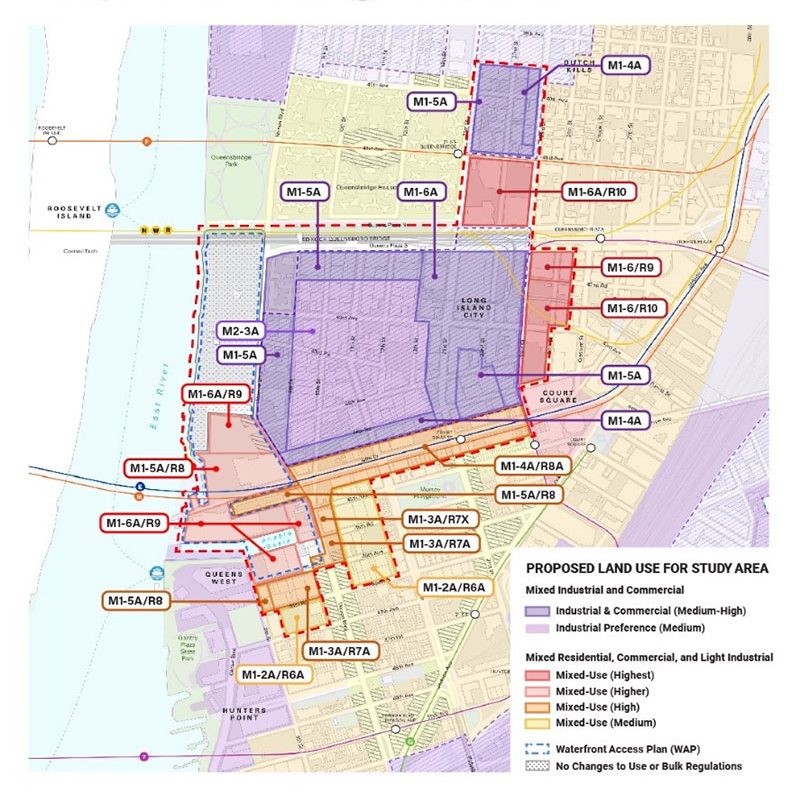By Celia Bernhardt | cbernhardt@queensledger.com

One LIC’s proposed zoning districts. Courtesy of NYC Department of City Planning.
Elected officials and community members urged the Department of City Planning to slow down their timeline for the Long Island City Neighborhood Plan at a public scoping hearing on Monday.
The hearing, which took place over Zoom, was the first meeting on the topic since the city unveiled a draft zoning framework for the Neighborhood Plan (also called One LIC) at a June 25 town hall. The city released a 65-page draft scope of work on July 12 — a final scope of work, which serves as the basis for an environmental review, is the next step.
“I want to put on the record that I am displeased that the Department of City Planning did not schedule this hearing for September, despite numerous requests for myself, the Community Board, community groups, as well as overlapping elected officials,” Council Member Julie Won said in her testimony at the scoping meeting.
One LIC, a neighborhood-wide rezoning plan focused on accommodating growth in the area, has been in the works since October 2023. It was launched by DCP, Won, and an urban design firm called WXY Studio. Eleven public meetings to gather feedback took place throughout the year leading up to the draft zoning framework released on June 25.
Community boards are often heavily involved in reviewing and providing feedback on proposed zoning and land use changes; they also usually take a pause during the summer months, with meetings and duties ramping back up again in September. In a July 31 letter to DCP Chair Daniel Garodnick that she posted to Twitter, Won slammed the City’s timeline for One LIC updates and meetings.
“The City’s rapid timeline is leaving my community feeling frustrated and embittered with the city planning process,” Won wrote. “There was no draft zoning framework presented until June 24, 2024, after Community Board 2 had already finished for the year. The draft scope of work was released on July 12, also during the community board’s summer recess. While the City has extended the deadline for written testimony to September 11, this still falls before relevant community board meetings which were scheduled months in advance.”
In a response sent the next day, Garodnick’s office said they would not delay the hearing, arguing that “postponing the hearing date would unfortunately delay our analysis of the environmental impacts and district-wide infrastructure assessment, and would impact the overall project timeline.”
After an environmental review and a period of continued public engagement, DCP is set to release a draft neighborhood plan in the Spring of 2025 and then move into the ULURP process.
Won was not the only attendee at the hearing who expressed frustration at the project’s timeline. State Senator Kristen Gonzalez, Community Board 2 member Danielle Brecker, and others urged the DCP to extend the period for written testimony past September 13 to allow for the board to study the plan and provide feedback.
Chief among the concerns that attendees voiced about the content of the draft zoning plan was its allotment of affordable housing. Out of 14,000 new units that the plan would allow for, only 4,000 would be income-restricted via the Mandatory Inclusionary Housing program — and rent for those 4,000 units would be set for residents earning 60 to 80 percent of the area median income, meaning a one-bedroom would cost between $1,747 and $2,330. Numerous testimonies argued that this fell far below what the neighborhood needs.
“The vast majority of housing need, as shown by rent burdens, overcrowding, other measures, and the amount of homelessness that we are seeing in our district alone — let alone the whole city at large — is among households with incomes below 50% AMI,” Won said. “New market rate housing will not help these families find sustainable homes.”
Gonzalez agreed.
“This area is already suffering serious consequences from over development, and it is essential to ensure that any development in this area benefits the community and addresses existing deficits,” Gonzalez said. “I’m calling for the inclusion of the maximum amount of deeply affordable housing.”
A representative for Assemblyman Zohran Mamdani echoed support for maxing out deeply affordable units.
After an environmental review and a period of continued public engagement, DCP is set to release a draft neighborhood plan in the Spring of 2025. Then, One LIC will move into the Uniform Land Use Review Procedure, a final seven-month process which incorporates reviews from the Borough President, City Planning Commission, and City Council.


